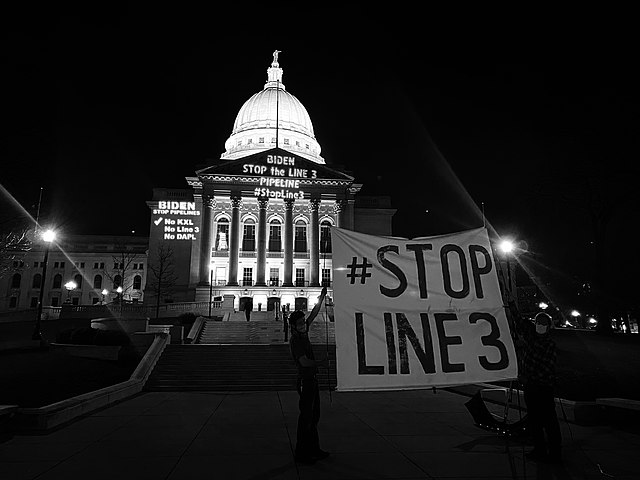Igwebuike: Line 3 Pipeline encourages climate change, disrespects indigenous peoples
September 16, 2021
Recently, members of the Anishinaabe tribe have been fighting for their culture and territory against construction on the Line 3 Pipeline. The Anishinaabe are a group of indigenous peoples who live in Southern Canada and northeastern United States: from the Ottawa River west across Northern Ontario to northeastern Michigan, North Dakota and northern Minnesota.
The Line 3 Pipeline is a 1,097-mile oil pipeline built in the 1960s that extends from Edmonton, Alberta in Canada to Superior, Wisconsin. The line was built by Enbridge, a Canadian corporation that handles the transportation of oil and natural gas in North America. It has a history of crude oil spills, including one in 1991 that leaked 1.7 million gallons of oil into the Prairie River near Grand Rapids, Minnesota and another in the Kalamazoo River in 2010 that cost over $1.2 billion to clean.
In 2014, Enbridge proposed a plan, known as the Line 3 Replacement Plan, to build a new pipeline route that would bring nearly a million barrels of tar sands per day through its route. In 2020, Minnesota Gov. Tim Walz gave the company the permit needed to begin work on the Line 3 Replacement Pipeline in the state.
However, the company fails to acknowledge how the project will harm the tribal lands of the Anishinaabe tribe. Enbridge designed the pipeline to be built through the group’s Minnesota territory and untouched wetlands. If the pipeline is built through these lands, potential oil spills could contaminate these wetlands, as well as lakes, rivers and other waterways in the state. The Anishinaabe depend on these lands for farming wild rice, a centerpiece of their culture. Not only that, but the replacement plan violates the signed treaties between the U.S. and Anishinaabe people from 1825-1867, which grant them the right to live, fish and farm in these lands. The completion of the pipeline will dishonor the Anishinaabe community and the lands they have worked diligently to preserve.
The oil spills also have the capability to cause water pollution in the wetlands. The water pollution can exacerbate the ever-growing problems associated with climate change, which influences temperatures to rise and ushers in more severe weather, such as deadly tornadoes and hurricanes. In fact, just last week, Hurricane Ida caused severe flooding and became the second-most damaging and intense hurricane to strike the Southeast, affecting many homes, businesses and schools.
Based on Enbridge’s history of oil spills, there is no reason for the Anishinaabe community and environmental activists to trust the outcome of this project. There have been several protests to combat the construction of the pipeline in Minnesota, including marches and sit-ins, but to no avail. Appeals to the Minnesota Supreme Court made by the Anishinaabe have been declined, and many activists have been arrested during protests.
I find it concerning how officials fail to see the issues with the Line 3 Replacement Plan. Everything about the pipeline is unacceptable: from the human rights it violates to the climate crisis it encourages. Anishinaabe protesters should not be arrested for protecting the land which has been rightfully theirs for over 200 years, nor do they deserve to watch their beautiful wetlands be tarnished by oil spills and pollution.
It is also important to acknowledge that the pipeline doesn’t just affect the Anishinaabe and the wetlands of Minnesota; it affects all of us. The growth of fossil fuel and oil transportation projects only increases the risk of climate change within our community. Within the past year, there have been numerous reports of tornadoes and hurricanes that devastated the South, which includes Mississippi, and there will be more to come if we do not take action. We all need to do our part to urge Walz, President Biden and other authorities to put a stop to the Line 3 Replacement Plan and preserve indigenous cultures and the Minnesota wetlands.








